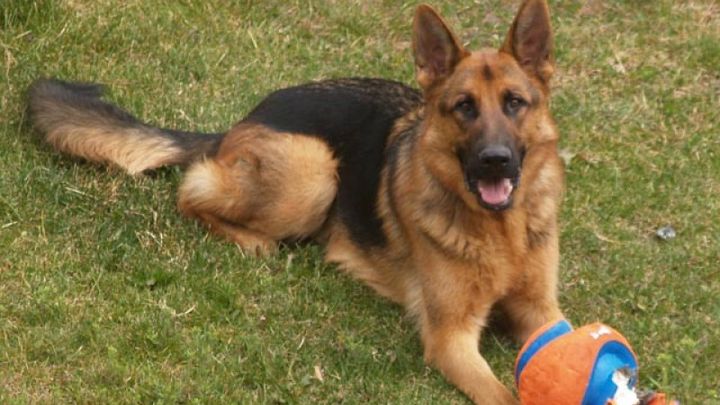
Christie's Service Dog Fund
Donation protected
Christie's Service Dog Fund
SUMMARY:
I'm Christie Goodman. I'm 44 years old and live on an off-grid horse ranch in the Rocky Mountains of Western Montana.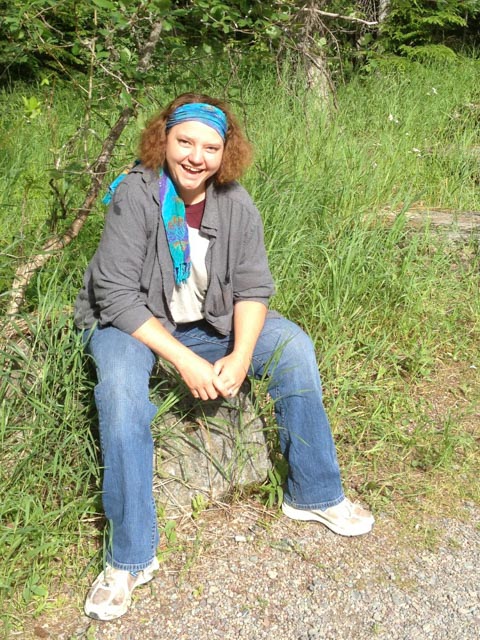
I need a service dog. I have the dog - I bred his mother and raised him myself. His name is Kaladin, and he is a year old and weights almsot 90 lbs already.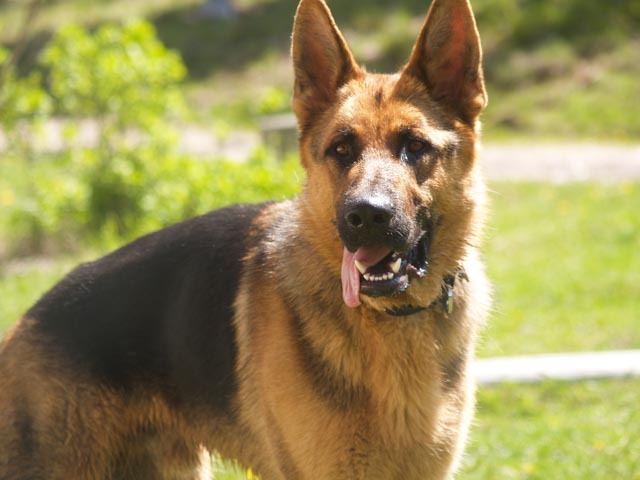 He is full of energy and his trainers say he is one of the smartest dogs they have ever met. He loves people and his favorite thing in the universe it to chase a ball. He will run after the ball hour after hour all day long if I let him - or at least until he jumps in the creek to cool down and looses it in the water.
He is full of energy and his trainers say he is one of the smartest dogs they have ever met. He loves people and his favorite thing in the universe it to chase a ball. He will run after the ball hour after hour all day long if I let him - or at least until he jumps in the creek to cool down and looses it in the water. 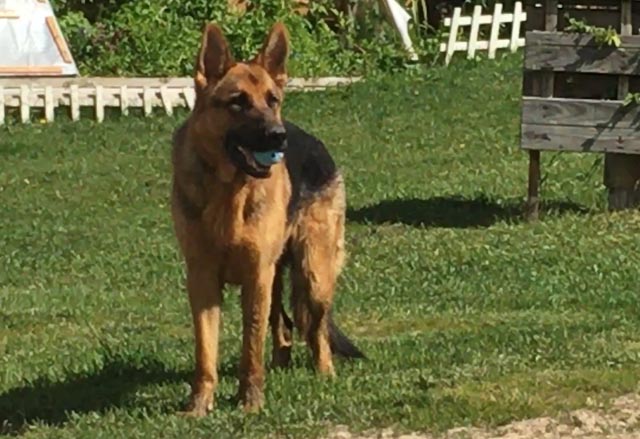 (Actually, if he knows where he droppd it, he will duck his head all the way under and get it back, but if he isn't paying attention, I have to do a daily round of hisfavorite dipping spots and pick it up for him. Water is probably his second favorite thing - well, water and treats. Well, water and treats and kids - he can't resist kids. Kids easily top treats and may even top water. Get a kid to throw the ball for him, and he is in heaven.)
(Actually, if he knows where he droppd it, he will duck his head all the way under and get it back, but if he isn't paying attention, I have to do a daily round of hisfavorite dipping spots and pick it up for him. Water is probably his second favorite thing - well, water and treats. Well, water and treats and kids - he can't resist kids. Kids easily top treats and may even top water. Get a kid to throw the ball for him, and he is in heaven.)
Right now Kal is a big, energetic puppy, but he has the seeds inside him to be a lot more than that as well. He has the drive, the dedication, and the bond to me that he will need to become my partner and my service dog. He has the potential to give me a gift no-one else can give me - to give me back much of the indipendence I have lost to this illness.
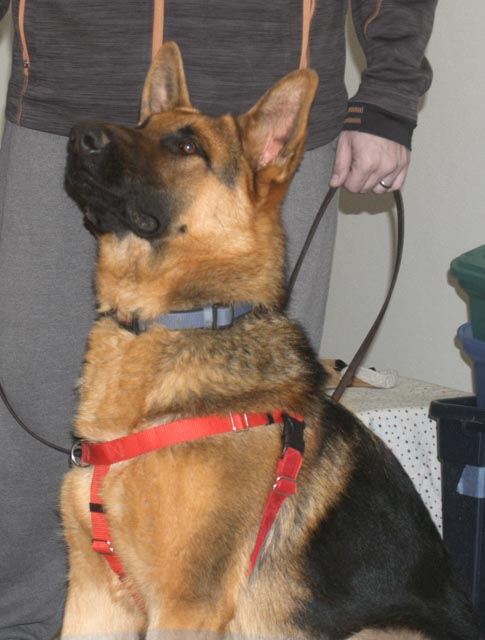
Kal's been preparing to be a service dog since he was born - he sits quietly in restaruants, goes calmly into stores. But now that he's old enough to begin the bulk of his serious task training, we've hit a snag.I’d planned to do his primary training with the guidance of an afordable, local organization which helps people train their own service dogs . This organization would have cost much less than traditional professional training and we spent four years saving up the money to cover it. But my illness has progressed more quickly than I expected, and I have recently become unable to do the training myself. Thus, if Kal is going to be my service dog, we will need to have him trained by a more traditional training organization - and that means a great deal more cost. We need to raise about $26,000 to make this happen.
We have the plan, we have the dog, we have the need. Now we just have to find the money!
-----------------------------------------------------------------------
FINANCIAL DETAILS:
I am working with Wind River Tails and Trails , an exceptional training facility near our home. He will be ready to start his task-specific training soon, and that will continue for the next year. I have run the numbers on what it will cost to get Kaladin from where he is now to his certification as a fully trained service dog - a project that we expect to take about a year.
The training itself will cost between $5000 and $10,000, depending upon his comfort level and readiness. I'm planning for $10,000 in the assumption that it is always better to overestimate than to underestimate.
His food costs $108 per month, or $1296 for one year. Regular vet expenses for a year should run about $350. Flea and Tick medicine costs $137 for a year’s supply and heart worm medication costs $80 for a year’s supply. Service dog equipment (vest, harness, etc.) should run about $450. Weekly grooming will cost $200 per month, or $2400 per year. Toys, bones, beds, crates and other basic dog supplies look like they would run about $600 for the year. And finally, in trying to figure out how to plan for emergencies, I found a very good health insurance program for service dogs which runs $1152 per year and I would like to have $2000 in savings for deductibles or anything I have not thought of yet. That comes to a total of $18,465 for the total cost of getting him trained.
In addition, he needs a lot of experience just going around town with somebody and I am not able to provide that myself. My doctors think I need about another six months of pretty serious rest to stabalize my condition, and I am finding it increasingly difficult to keep up with this puppy that I love, much less get him the increased experience he needs with public acess. Thus, I have been working on trying to find him a foster home for the next six months - someone who will work with his trainers and take him everywhere they go, helping him adjust to the life of a service dog. It is possible that I will be able to find a volenteer to do this, but, if I can't find the right person this way, it has been suggested that I offer a stipend of $400 per month to a qualified person. That would add $4800 onto the total, bringing the cost up to $23,265, or, just under $23,500. And finally, gofundme.com takes some off the top for running the campaign, as does the bank that manages the donations. That means inflating the amount by 10% for fees. That adds $2350 and brings the total to $25,850, or just under $26000.
This is actually at the lower end of the typical cost of purchasing a service dog, which normally runs between $20,000 and $30,000 when purchased fully trained through an established service dog organization. But its still a lot more than we can come up withon our own, especially given the level of medical expenses my illness has added onto our lives these past few years.
The trainers I am going to work with have recomended GoFundMe.com as part of our plan to raise money for this training, so I am going to give this a try.
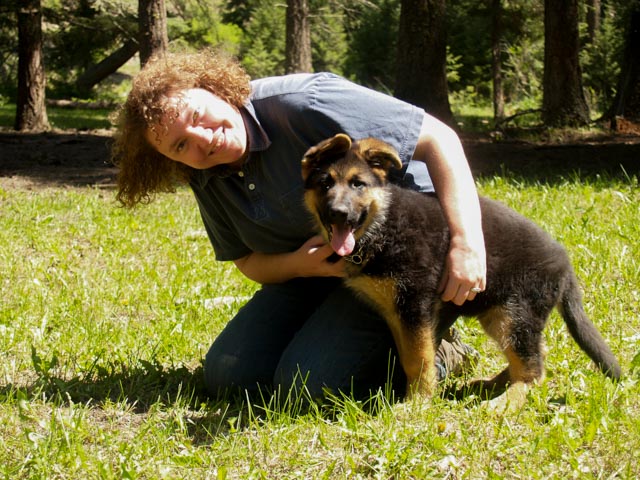
-----------------------------------------------------------------------
OUR STORY IN A LOT MORE DETAIL:
I put most of our basic infomration above, but if you want to know us better, here is our story in detail.
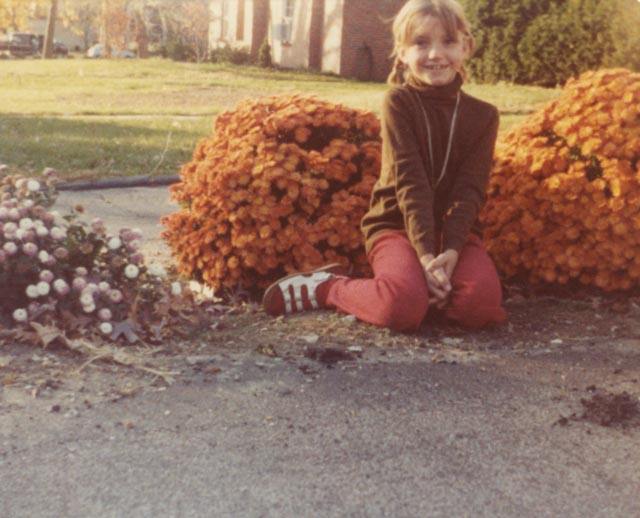 I and grew up in the mid-west. My husband and I lived in Chicago when we married, where Dave worked while I finished my college degree. But we wanted a different kind of life. We found it on an off-grid horse ranch in Montana.
I and grew up in the mid-west. My husband and I lived in Chicago when we married, where Dave worked while I finished my college degree. But we wanted a different kind of life. We found it on an off-grid horse ranch in Montana.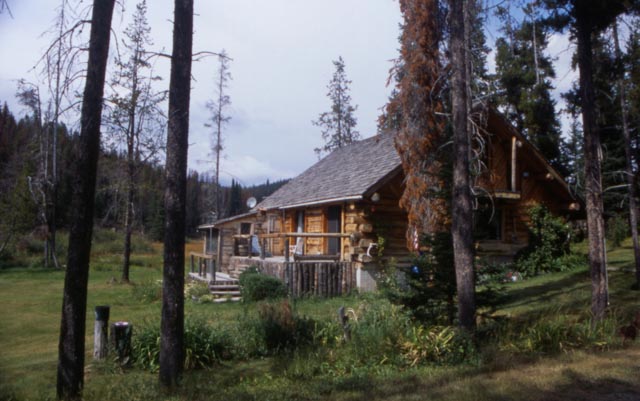 For the last ten years I have raised Rocky Mountain Horses on our ranch, taught riding lessons and hosted horse-related events. Dave wrote computer software, first for a company in Chicago and then one in Denver. When we first moved here our only lights were gas lanterns and if we really needed electricity, we had to pull-start a small generator on the porch and plug whatever we needed into it. We now have full electricity (mostly solar) and good internet - good enough to allow Dave to work full time from an office at ranch, so that we are both able to live here permanently now.
For the last ten years I have raised Rocky Mountain Horses on our ranch, taught riding lessons and hosted horse-related events. Dave wrote computer software, first for a company in Chicago and then one in Denver. When we first moved here our only lights were gas lanterns and if we really needed electricity, we had to pull-start a small generator on the porch and plug whatever we needed into it. We now have full electricity (mostly solar) and good internet - good enough to allow Dave to work full time from an office at ranch, so that we are both able to live here permanently now.
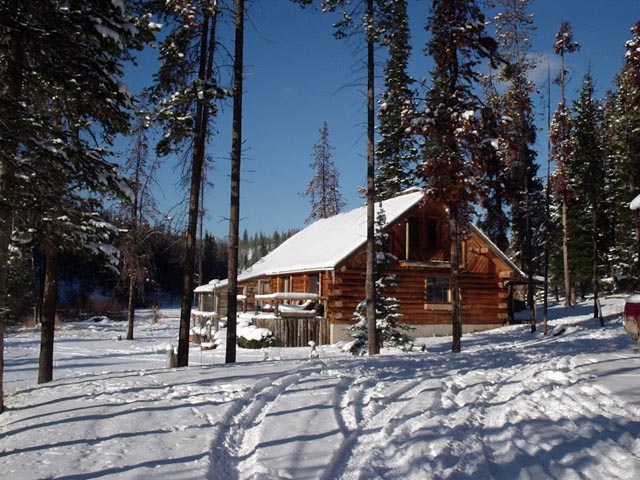 We live in heaven. We've always sworn that we want to live out the rest of our lives on this ranch. But the past two years has tested that resolve.
We live in heaven. We've always sworn that we want to live out the rest of our lives on this ranch. But the past two years has tested that resolve.
I've always been sick. I developped Rheumatoid Arthritis when I was 16 and struggled with pain, join damage and exhaustion for ten years after that. At times I had trouble walking or holding a pen. But I refused to let this slow me down. I still won a scholarship to spend my Junior year of high school living abroad and traveled every chance I got. I started college with two majors, two volenteer jobs and a paying job. Through my early 20's I often had to sleep 3-4 hours every afternoon and would ocassionally build up enough exhaustion to collapse and be unable to move or even speak for days after that. Then I would drag myself out of bed and throw myself into life again.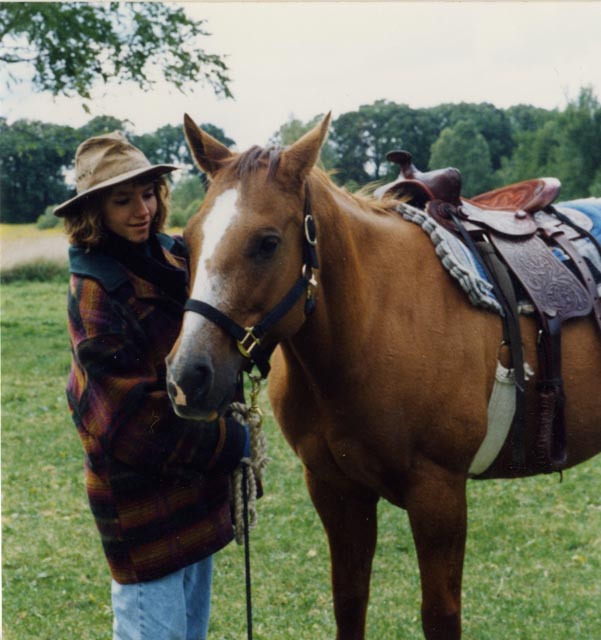
Sometime in my mid-20's the arthritis faded away and something else took its place. Now-a-days they call it Chronic Fatigue Syndrome, or Myalgic Encephalomyelitis (M.E.). What that means is that I take in food, sunshine and exercise, but my body isn't able to transform these things into energy the way it is supposed to.
So there's the exhaustion - sometimes so severe I cannot hold my own body up in a chair - and there is the damage that this illness does to my body's systems. Over the years, my body's supply of energy has been so low so often that it has had to regularly shortchange some of its systems to keep me functioning and alive. This has done damage to my heart and my nervous system, and my digestive system, mostly. These days, researchers have a pretty good understanding of the kind of damage that is done as this illness progresses, but they can't say for certain if any of it can be reversed. The one thing they all agree on is that pushing myself to keep functioning through the exhaustion (as I've always done) will destroy any hope I have of recovery and repair. If I want to have any chance of recovering from this illness (or at least keeping it at a managable level), I have to shut down my life and stop pushing to do all the things I want to do.
This prescription goes against who I am at the core. For 20 years I have thrown myself into living the life I wanted, refusing to let this illness rob me of my dreams and my potential.I lived for a time in a remote cabin in the high Rockies of Colorado with no running water and no electricity and a horse as my only transportation. I ran an herbal business wildcrafting and making herbal medicine and body products for sale. I opened a horse ranch, teaching adult beginers everything they needed to know to own their own horse. I lived in a tee-pee in the Rocky Mountain National Forest and I spent months walking or riding through the wilderness just me, my dog and my horse.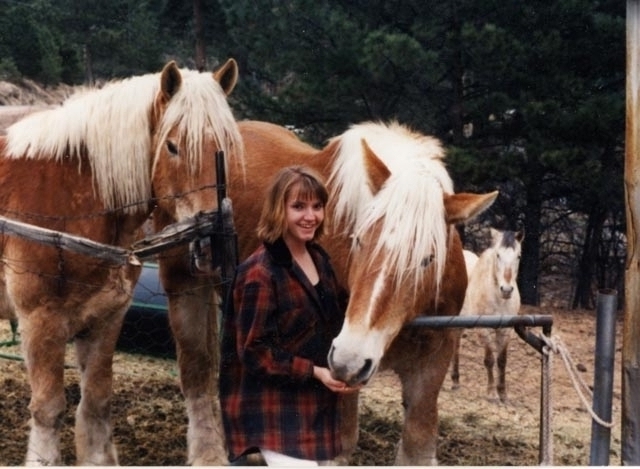
I never did any of these things for long. A few months, maybe. The longest lasted two years. At first, I thought that I would be able to overcome my illness if only I immersed myself in something I loved so much that nothing else was more important. Then I thought that if I lived in such extreme ways that the only choice I had was to to function or die, I would break through whatever it was that was keeping me down - mind over matter and all that. I learned to ignore pain and push through exhaustion so extreme it would blur my vision. When that didn't help, I went to shamans and learned about plant medicine and tried to overcome whatever it was inside myself which believed in this illness. But always, eventually, my health gave out again. I collapsed, sometimes in very dangerous ways which I was lucky to live through, and had to be carried back to my mother's house for months or years of recovery before I was again strong enough to take care of myself. Then I would concieve some other plan - some other life I wanted to have - and set out to try again.
By my late 30’s I began to see that this cycle was destructive. I had spent my life fighting this illness and the fight seemed only to make it worse. After each crash, I recovered a little bit less than before. My baseline "norm" seemed to creep ever lower. And I hadn't found a life I was satisfied that I could sustain.
In my late 20's I met and married Dave, and moved to Chicago where he worked and lived.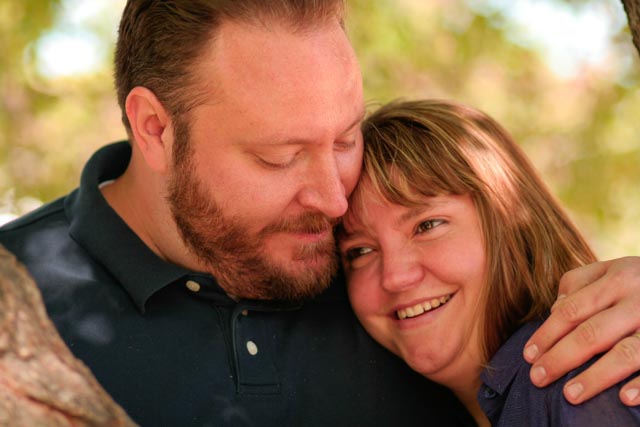
I decided I needed to finish my college degree - something which had been interrupted three times when I had become too sick to get myself to classes. It isn't that I thought I’d use the degree to get a job - by this time I knew it was unlikely that I would ever have a career - but my life had been full of goal after goal which was interrupted by my failing health. I NEEDED to finish something. I no longer believed I could just throw myself wholly into a project and make it happen through shear force of will. This time I I tried it slow and steady.
I took one class at a time and every other term I took off to recover from the toll the last term had taken. Sometimes I was too weak to sit in a chair and would lay in the back of the classroom and listen. I got my text books on cassette tapes so that I could lay in bed and listen to them when I was too weak to sit up or hold open a book. I was introduced to the campus security guards at the start of every term so that if I were found, collapsed, around campus sometime, they would know me and know what to do. I had a permanent room set aside for me in the health center so that I could sleep there if I became unable to make the 10 minute drive from campus to my home. I graduated with a degree in philosophy. It took me eleven years from start to finish to get my college degree.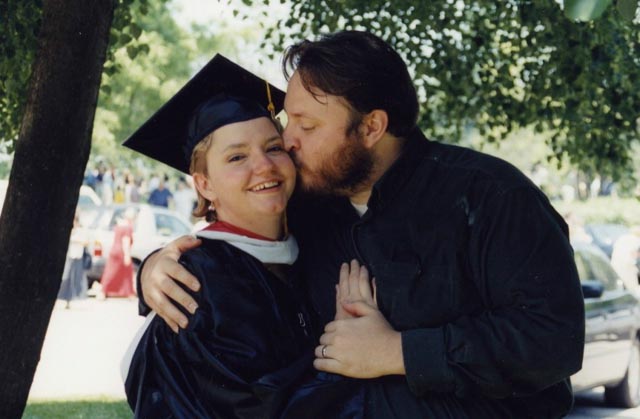
Along the way we had figured out that living in the mid-west was not ideal for me. The humidity there seemed to make my illness worse. During the summers, I often couldn’t leave the house alone, as I would become weak and disoriented - often confused about where I was and why - before I even reached the garage. I began dreaming of living in the Rockies again, where I knew the climate was far better for my health. While Dave had never had the love of the wilderness that I have, he had begun to wish for something different than suburban Chicago as well. In 2003, we found an off grid horse ranch outside of Missoula, Montana and decided to take a chance on a different kind of life.
Almost over night, my health was better than it had been in years. My energy was still lower than normal, but I often had 3-4 hours in a day when I could be almost normally active - riding horses, hiking, working. Then I would need to sleep for 3-4 hours and then I would have a few hours in the evenings when I had the energy to do a few quiet things before bed. The pain I so often felt was minimal and could usually be ignored. For a year I lived on my own in our cabin in Montana, while Dave had to stay in Chicago for his job, and I loved every minute of it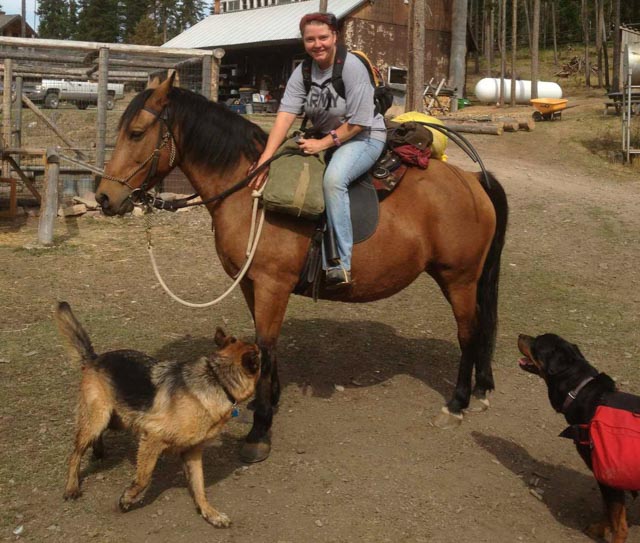
With my greatly improved health, I dove into life. I discovered an amazing breed of horses and fell into an opportunity to open a business raising those horses. I did that for ten years, breeding and raising horses, teaching people, caring for animals.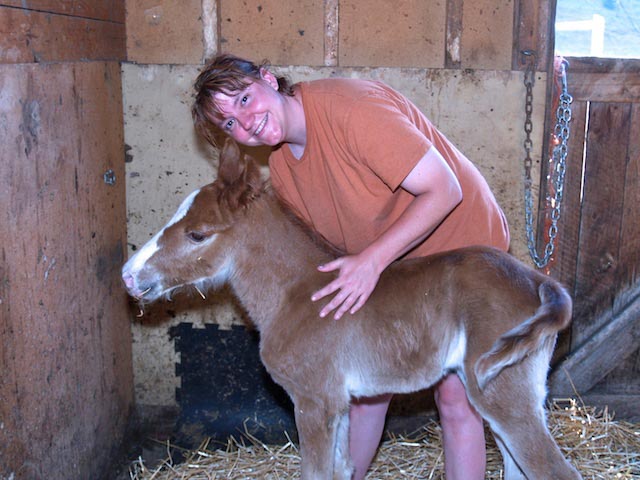
Dave was eventually able to work remotely, thus living at the ranch full time, and we started talking about having kids. Adopting or fostering or maybe getting pregnant. My business boomed - my horses were exceptional and people came from all over the country (and sometimes the world) looking for them.
It took a number of years for me to see that I had slipped again into my old habits. I was feeling so much better than I was use to that I pushed myself every day to squeeze just a little more out of my body. My health went steadily down hill - slowly at first - as each year went by. Each time I crashed, I seemed to recover just a little bit less than I had before. And I began to spend each day a little more exhausted and in a little more pain than the day before. By the time we’d had the ranch for eight years, I was in pain every day. I was regularly so exhausted my whole body screamed in pain from the time I woke up to the time I went to bed. I was sleeping 15-17 hours a day just to allow me to function at all. We had to get a chair with arms for me to sit in at meals so that I could sit at the table without falling over. I pushed longer and harder to keep this life than any I had had before. I’ve always had a will of steel. But in the end it turns out that the strength of my will power may have been the worst thing for me.
I won’t go into the details of the years of ups and downs and struggling to keep my business going and my horses selling. About four years ago I finally accepted what should had been obvious long before - that I couldn’t keep living like this. The pain never stopped, every time I moved I felt like I was dragging a hundred pound weight from each of my limbs. I finally accepted defeat. I would close down the business. I would accept that I would never have kids. I would rest.
Then my doctors stumbled onto a medication which, actually seemed to WORK. All of a sudden my illness went away. For the first time in my adult life, I could get up in the morning and not need to go back to sleep until evening; I could work all day and go out to dinner with friends in the evening and still spend a few minutes straitening up the house before bed. I wasn’t in pain any more. I rode horses for hours at a time, kicked my business back into gear and started talking again about having kids again. That lasted for three months. Then, without warming, the medicine stopped working.
We spent a year trying to get it to work again. We didn’t know at the time that it was actually doing damage, but eventually that became clear and my doctors wanted me to stop it all together. I fought them. Before that year, I had been ready to accept this illness and this life for what it was. I had been ready to give up my dreams and live the life I was given. But now…now I was ANGRY. I could not accept. I had seen what life COULD have been like - SHOULD have been like - for me, and I could find nothing but rage at the life I now had.
We know now that the year of taking the medication which seemed to help so much and the months of raging and refusing to slow down and accept my limits when it stopped working, did significant damage to my body which may not ever heal. When I was first diagnosed with this illness, doctors knew so little about it that many refused to believe it even existed. But now enough research has been done that in many ways it is remarkably well understood. Someone with my severity who doesn’t do everything they can to get the rest their body so badly needs, eventually begins to do serious damage to various organ systems.
My nervous system is affected. I’ve begun to have twitches and tremors. And I have periods of time when my brain doesn’t work the way it should. I get confused, disoriented, unable to figure out who or where I am. I can’t complete sentences, losing track of my thoughts or just losing my grasp on words. I have intensified spells in which all of these symptoms hit and become severe for a period of time, and these “episodes” can be recorded and tracked on a brain scan. There are problems with my heart and lungs as well, and my digestive system. It turns out that this damage can be prevented, but only if I don’t push myself to do more than my body is able to do. Only if I shut down my life and let myself be sick, sometimes for years at a time, and DON'T FIGHT it. That has never been something I knew how to do.
But eventually I was forced to learn. Eventually, I crashed harder than I have ever crashed before and no longer had the ability to fight. And somewhere in this experience, I was finally able to accept that it truly was time to stop fighting - or at least that I no longer could.
When this last crash happened, I was virtually unable to function for months. I slept 20+ hours a day, and could not even sit up in a chair to eat meals. With Dave’s help, I was able to exist like this for the months it took to finally begin to recover.
I’ve gotten to the point now where I am able to be up and about 10-12 hours most days. Some days I do better - I even went on a few brief horseback rides earlier this spring. But most days I find it difficult to sit up for very long and get out of breath even walking out into my yard. Any time I overdo it, even a little, I am set back severely and spend a month or more just getting back to the point where I can stand long enough to warm up a meal for myself or go anywhere further than the living room couch. But when I am careful and when I am resting, I do have some days that are not so bad. I am unable to stand long enough to go shopping or into town for a meal without needing a wheelchair. That’s pretty much become a constant, if I leave the ranch at all. And I don’t know if I will ever manage to sit through more than two hours of a show, a class or an event without having difficulty holding myself up in my chair. But as long as Dave drives (both the car and the wheelchair) I sometimes do well enough to enjoy going out and about for something fun. Though, I always do better if I stay at the ranch. Sometimes I can sit by my garden and weed, and plant, though sometimes just walking over to look at my garden has me out of breath and dizzy and needing to go back inside. And, as I said, once in a while, if I am careful, I have a good enough day to do something fun with the few horses I kept for myself once I shut my business down.
I am pretty sure that with another six months to a year of letting my body dictate everything I do - never pushing myself beyond what I feel up to at the moment - I will recover enough to find a better normal state of being than I have right now. I suspect I will always need a wheelchair when I am out in the world, and that I will need regular help keeping up with housework and care of the animals. And I have accepted that kids are not ever going to be in the cards for me. And I am working on picturing a life within these limits which I can love.
That’s where the dog comes in. Even on days when I am doing quite well, I can no longer go out on my own, without risk. If my energy dips, I can “crash” very suddenly and without warning. Where it use to be a gradual process I had time to prepare for and expect, now I go from fine to confused and disoriented without warming. When this happens, I suddenly find myself unable to think clearly or understand where I am. I am unable to reason well enough even to realize what is going on or that I need to go home or get help. And it turns out that these crashes can be sensed by a dog, even when they can’t be sensed by me. Kaladin has already begun to get my attention when these crashes are beginning and enabling me to get myself somewhere safe before they fully set in.
He is also being trained to pull a wheelchair and to go find Dave when I need help. There are a half dozen other things we are hoping to train him to do and he is an amazing dog - learning so fast and so tuned into me all ready. If he can be trained the way we envision, he will give me a measure of freedom I have not had for years now. A freedome I don't know that I will ever have again without him.
There are a lot of times when I am just going to need to be in bed. When traveling isn’t an option and resting is all I can do. But as I get stronger, I will again have the ability to do some traveling, venture out on my own, and experience the world again. I just need a little edge up when I do. A little bit of help and security to guard against some of the difficulties and dangers of this illness. And Kal can provide me with that.
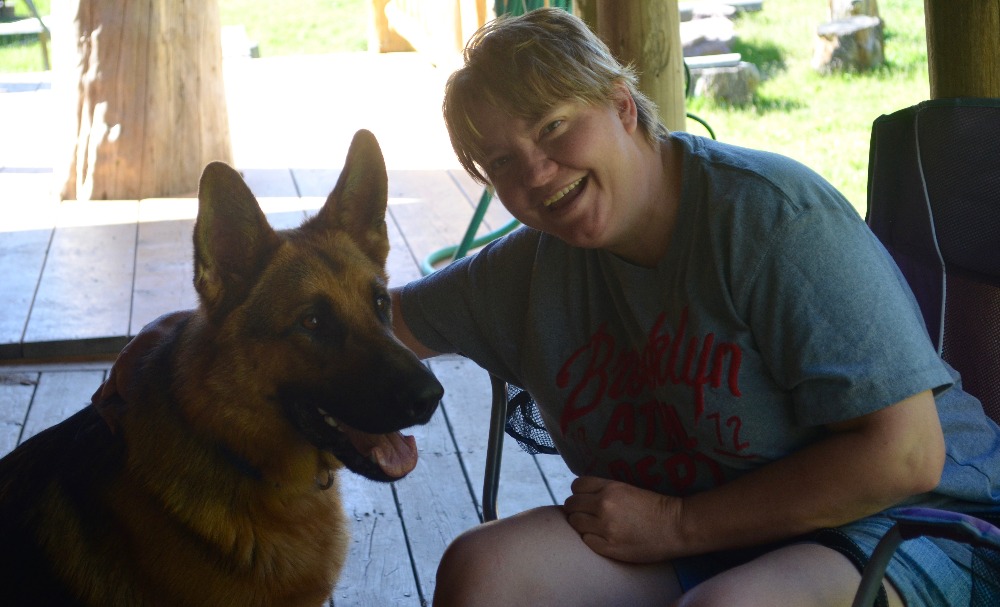
-----------------------------------------------------------------------
KALADIN: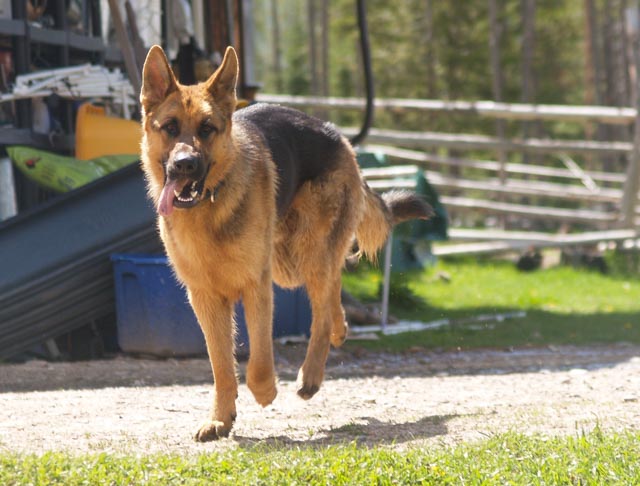
That’s a lot about me, now let me tell you about Kal. Kal’s story is also the story of a few other dogs. I have been blessed to have not one, but three of those once-in-a-lifetime dogs that we all dream of having.
I got my first German Shepherd in my 20’s with the idea that he might be able to be trained to give me an added measure of safety and freedom when my illness was just beginning.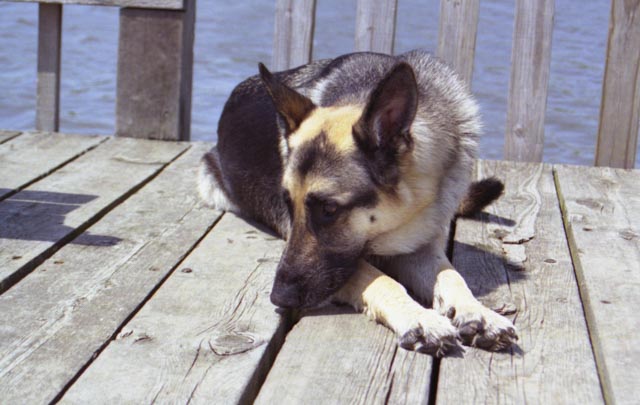 Back then nobody trained dogs for the kind of things I needed. So I trained him myself. Or at least I raised him and he seemed to come with the natural ability to do the things I needed. He saved my life twice before he was two years old. Once, when I collapsed 2 miles up a mountain trail in the middle of a blizzard, he managed to make his way to a highway and convince a man to stop his car and follow him those two miles into the wilderness in the middle of a snow storm to find me. This was an amazing dog.
Back then nobody trained dogs for the kind of things I needed. So I trained him myself. Or at least I raised him and he seemed to come with the natural ability to do the things I needed. He saved my life twice before he was two years old. Once, when I collapsed 2 miles up a mountain trail in the middle of a blizzard, he managed to make his way to a highway and convince a man to stop his car and follow him those two miles into the wilderness in the middle of a snow storm to find me. This was an amazing dog.
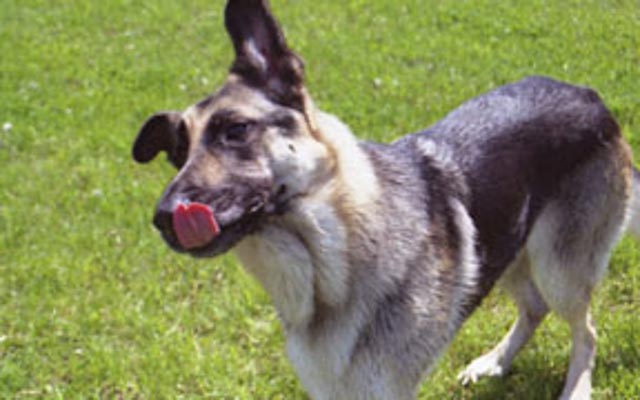 Rajah lived to be 14, my protector and my companion for all of those years. At 14 he died peacefully in his sleep while doing one of his favorite things in the world - riding beside me in my truck.
Rajah lived to be 14, my protector and my companion for all of those years. At 14 he died peacefully in his sleep while doing one of his favorite things in the world - riding beside me in my truck.
When Rajah died, I realized that I had come so fully to rely on him to give me an extra edge of safety when I was out in the woods alone that I felt I needed an adult dog who could step immediately into this role.
I found a 110 lb., 2-year-old Rottweiler who had been abused and was on the verge of being lost to people. He didn’t trust anyone and he was just beginning to decide the only way to survive was to fight everyone. But I saw in him something special - something that was not yet quite lost to trust and gentleness. And I spent the next six months with him tethered to my hip, cementing our bond every bit as strong as the bond I had had with Rajah.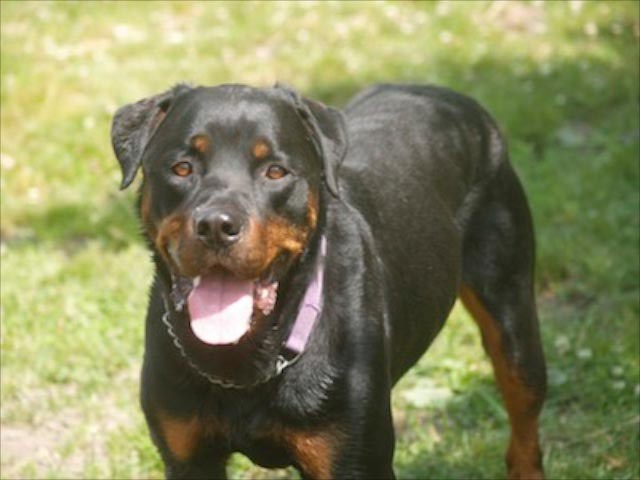
Thor was everything I could have hoped for in my protector and companion. He was different from Rajah in every way except the strength of his devotion to me. Where Rajah had been thoughtful and intelligent, Thor was a thug - throwing himself bodily into every situation. Where Rajah had been reserved and serious, Thor was a big kid, wanting to play, play, play with everyone he met. And Thor never did anything half way. His favorite toy was always a full sized car tire.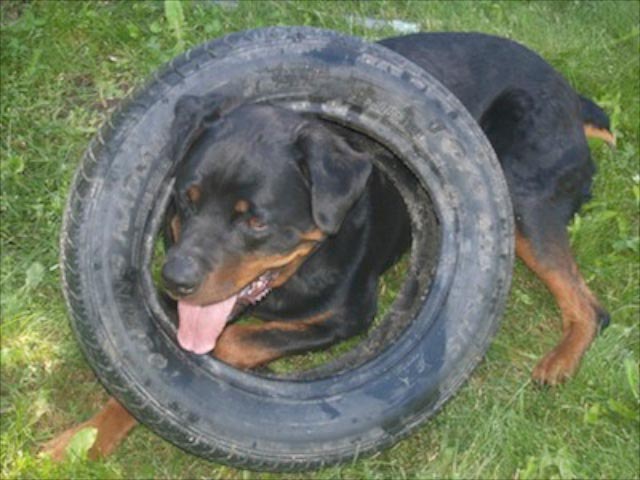
Over time he came to not only trust people but adore the experience of meeting new people. He was gentle enough to lovingly help me raise the orphaned new-born kittens the humane society sent me to bottle feed and nurse along until they were old enough and strong enough to be adopted out to homes. Thor would carefully keep watch over a squirming pile of kittens, letting them crawl all over him and keeping them from straying too far. Some of them were so small they would stumble into his open mouth and Thor would sit there patiently, a slightly pained look on his face, with his mouth wide open so as not to hurt them, until the kitten found its way back out. Yet his favorite toy was a full sized car tire.
I adored Thor. And, though I had been dreaming of raising another German Shepherd puppy for years, I soon came to realize that I had no interesting doing that any time soon. I didn’t want anything to take away from the energy I could devote to Thor and my bond with him. I didn’t want another special dog - I only wanted Thor.
Then, one day, Thor suddenly began crying in pain. We thought he had pulled a muscle in his leg and rushed him to the vet. But it turned out to be bone cancer and there was nothing we could do to save him. I filled him full of heavy duty pain medicines and took him home for one more day with my best friend. I sat with him all day and into the night, talking and holding him, and the following morning my vet came up to the house and we quietly put him down while he rested in my arms.
I was heart broken when Thor died. And I didn’t want to rush into my next dog. But I also knew that I would need the protection of a dog when I went out camping, hiking and riding that next summer. I had also been aware for some time that I would need a service dog in the next few years. So the plan that took shape in my mind was this:
1. Find an adult female German Shepherd of the kind of quality I would want a puppy out of, who seemed likely to be able to produce the qualities in her pups I would need in a service dog.
2. Breed her one time and raise the puppies (I have always wanted to breed and raise a litter of pups). Choose one to keep and sell the rest to help pay for getting the service dog trained. The female would be my dog forever, of course - and be spayed once I had the litter I wanted.
3. Train the puppy under the guidence of a local organization which helped people to train their own service dogs, and cost a fraction of the normal cost of a fully trained service dog.
Once I had the ideal plan mapped out, however, I found it rather overwhelming. How was I going to find just he right female dog at a price I could afford? But as it turned out, the whole situation fell together almost effortlessly.
I located a breeder in Colorado whom I respected and who raised the quality of dogs I wanted mine to be. And what do you know - one of her finest breeding females, a dog who tended to produce a natural ability in her pups for seizure alert work (the same kind of work which would allow a dog to sense my crashes), was ready to retire. The breeder didn’t want her dogs to spend their whole lives working, breeding or living as one dog among many in a kennel environment (even a very good kennel environment). She liked to retire them when they reached 6 or 7 years old, to homes where they could live out the rest of their lives as “just a dog.” She told me all about Jana and said she would put her within my price range if Jana could live out the rest of her life on my ranch, as my dog.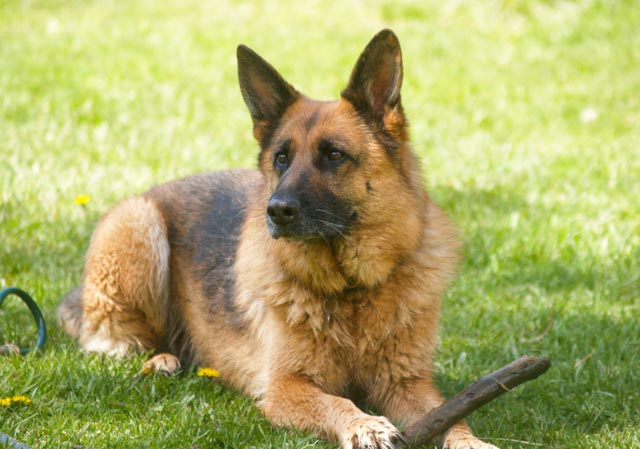
Jana was born in Germany, a beautiful, intelligent dog who bonded quickly and thoroughly to people. When she was younger, she took 9th place in the world at the International Schutzhund Completion in Germany, and her temperament was as perfect as any dog I have ever known. She and I fell in love immediately and I took her home.
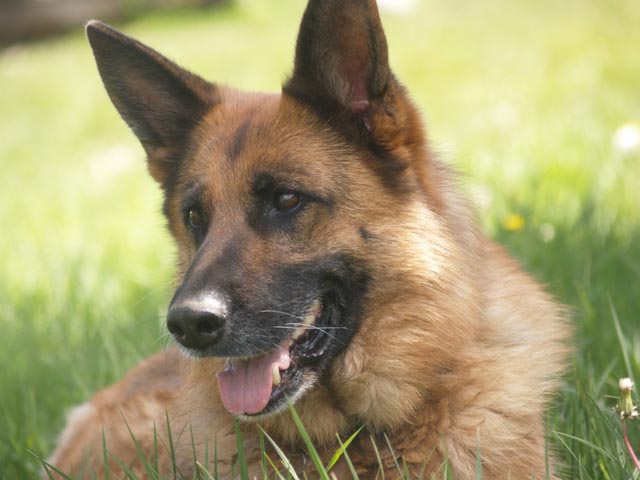
When I purchased Jana, I knew, of course, that I would love her dearly, but I did not expect to have the kind of bond with her that I had had with Thor and Rajah. And yet, it came. Jana is as different from Thor and Rajah as they were from each other. But she is no less exceptional, and no less important to me. And she was an experienced, talented mother. She patiently walked me through raising her pups.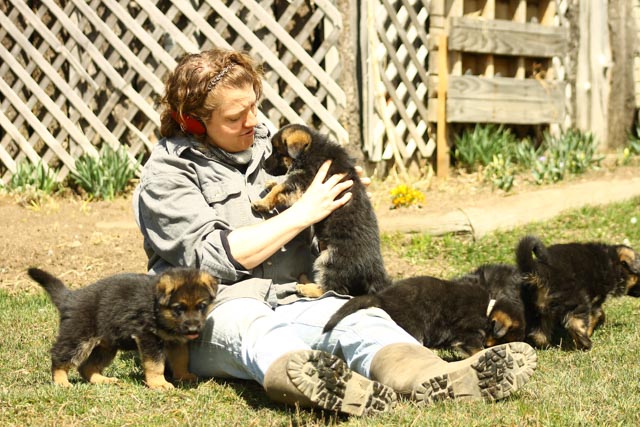 She had 8 puppies and she and I raised them together.
She had 8 puppies and she and I raised them together.
When it was time, I chose one puppy to keep for myself and the other 7 went to homes in Montana and Colorado. I named my pup Kaladin.About this time, my health hit is latest and worst crash.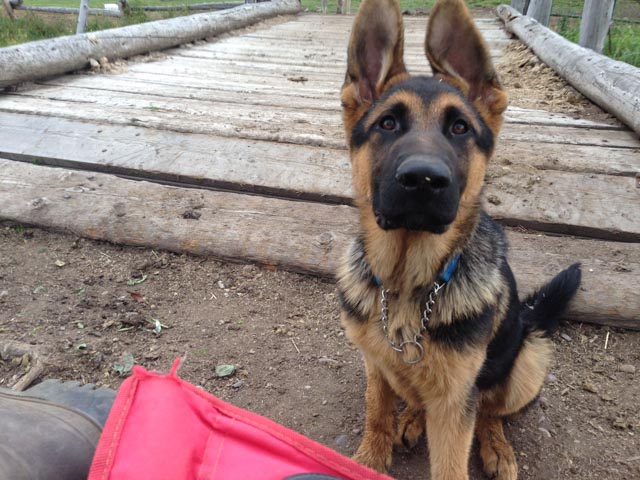 Kaladin was an easy, smart, willing puppy from day one, but it soon became apparent that, after years of preparation for this dog, there was no way I could raise a puppy at this time, much less take him through the training program I had chosen.
Kaladin was an easy, smart, willing puppy from day one, but it soon became apparent that, after years of preparation for this dog, there was no way I could raise a puppy at this time, much less take him through the training program I had chosen.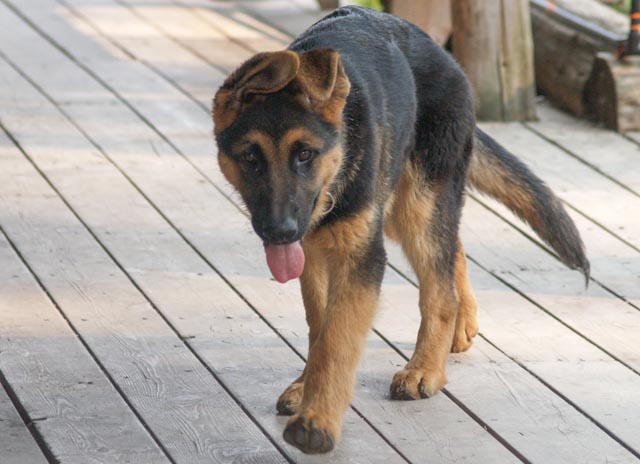 I thought I had to give him up - sell him or give him away and give up all these years of planning and dreaming and all the work that Jana and I had put into this dog - not to mention the love I already had for him.
I thought I had to give him up - sell him or give him away and give up all these years of planning and dreaming and all the work that Jana and I had put into this dog - not to mention the love I already had for him. 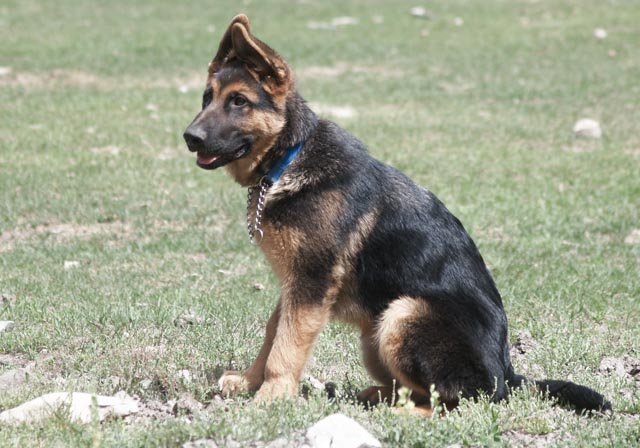 But then a local trainer told me that many service dog organizations have foster families raise their puppies until they are old enough to begin real work. She hooked me up with a client of hers who had done this for many years and soon I moved Kaladin into a foster home.
But then a local trainer told me that many service dog organizations have foster families raise their puppies until they are old enough to begin real work. She hooked me up with a client of hers who had done this for many years and soon I moved Kaladin into a foster home.
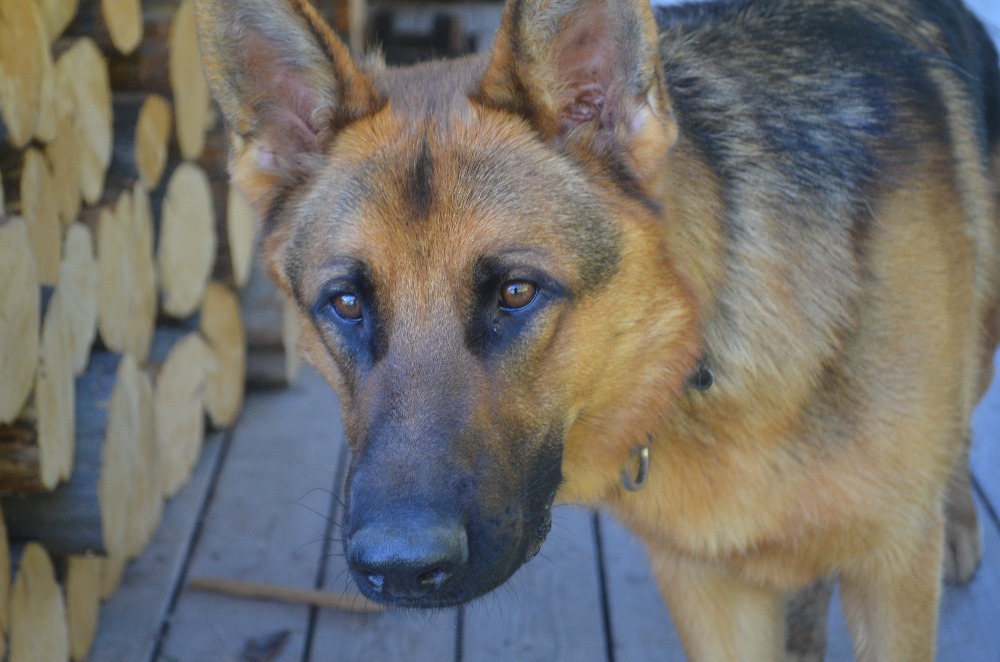
I found a local program I wanted to work with to get him trained, and began working on how I could afford that more traditional style of training. Kaladin stayed with his foster mom for six months while I recovered and built up my strength, and then his foster mom had some unexpected events in her life which changed what she was able to do, and she couldn't keep raising Kal.He came back to me then - about 6 months earlier than would actually have been best for my health, but even so, it was so good to have my boy home again.
He knew me the minute he saw me, even after six months away.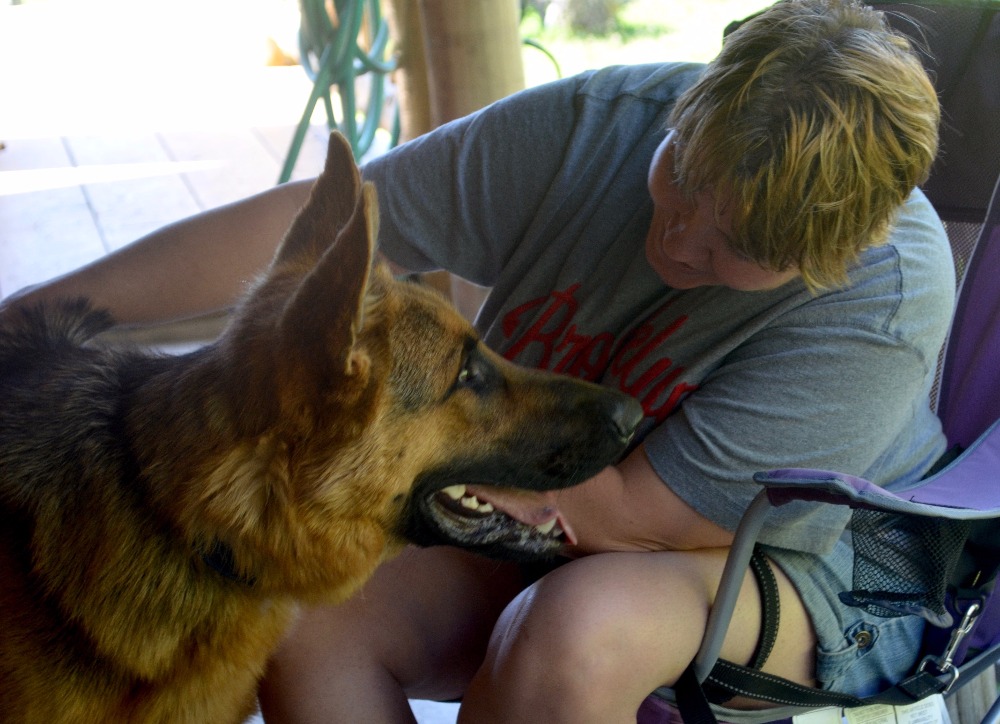
He knew I was his. At the time I went to get him, he was in the office of the organization who was overseeing his training. He was behind a permanent dog wall which allowed dogs to see and interact with people coming into the office, but not end up in their laps or wreaking havoc on the office. When he saw the door open, he happily began wagging his tail, sitting attentivily to meet whoever came through the door. And then he saw me. And he flipped out.
He began a desperate, loud keening sound and launced himself over the dog gate and onto the kitchen counters which seperated the dog area from the office. He scattered dishes and paperwork as he lunged into my arms. It took me half an hour to get him called down enough to sit by my side. He knew me. Despite six months away, he knew that I was his.
I took Kaladin home and set about settling him into a routine at our ranch. He is all puppy right now - wants to play and run and DO STUFF 24-7. And that has been pretty hard on me. But he is also mature enough to spend a lot of time in his crate and so I’m able to get at least most of the sleep I need. He is obsessed with chasing balls. He and his mom (who still adores him) will chase a ball for hours on end if I let them.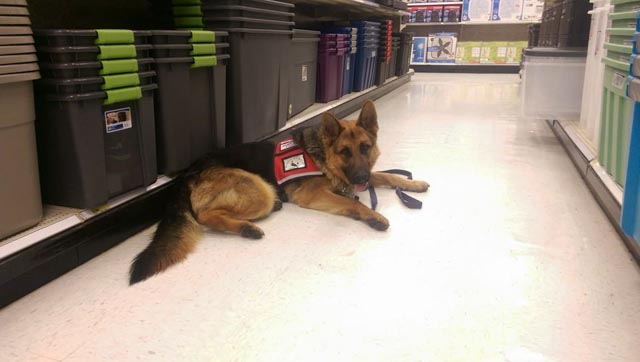
He knows all his basic commands, plus a half a dozen of the tasks he will preform as my service dog. He has had a lot of experience going about town with his “Service Dog In Training” vest, into stores and restaurants and is comfortable with my wheelchair.
Since he’s been home it has become even more clear that he is the right dog for this job. Twice now, he has been with me when I have “crashed” suddenly enough that I could not figure out what was wrong on my own. Both times he came to me and got my attention until I realized what was going on and could get myself the help I needed. He has the instinct and the bond to me.
He’s everything I hoped he would be. But, since I can no longer do the program which allows me to train my own dog, the cost it will take to get him fully trained is daunting. I’m just trying to trust that this is what is meant to be and so will all work out in the end. We have begun fund raising to help make this dream come true.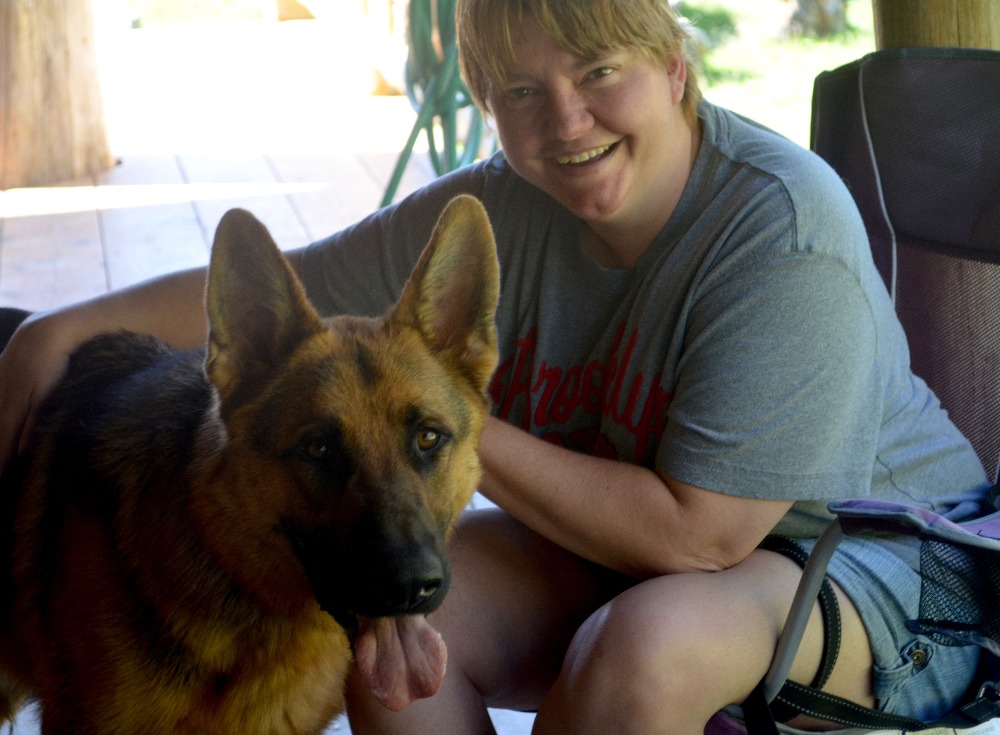
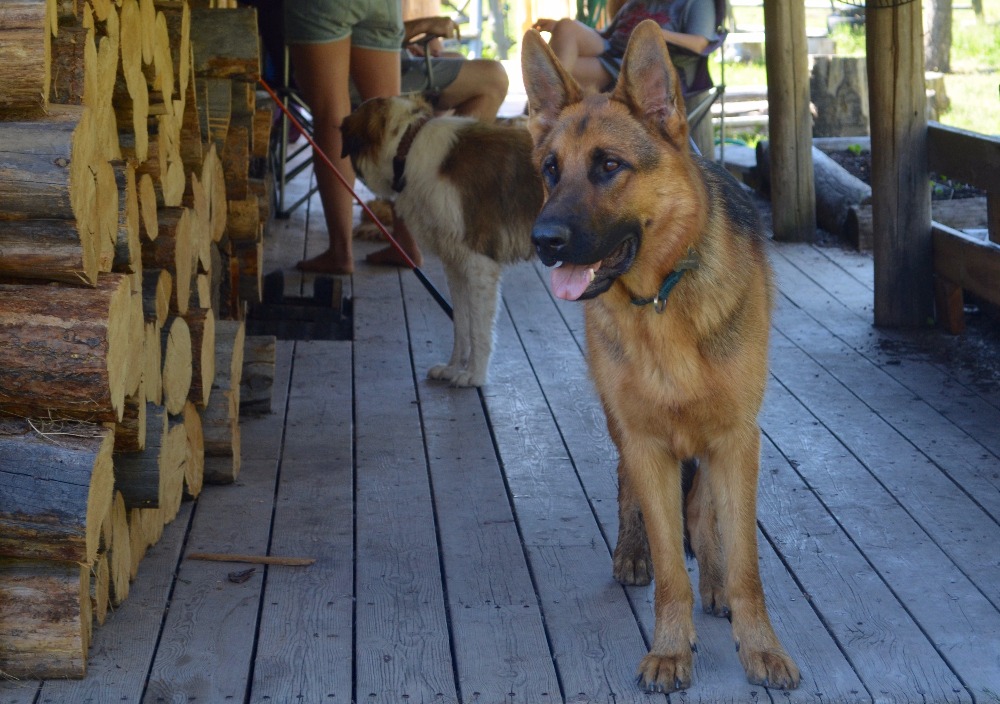
SUMMARY:
I'm Christie Goodman. I'm 44 years old and live on an off-grid horse ranch in the Rocky Mountains of Western Montana.

I need a service dog. I have the dog - I bred his mother and raised him myself. His name is Kaladin, and he is a year old and weights almsot 90 lbs already.
 He is full of energy and his trainers say he is one of the smartest dogs they have ever met. He loves people and his favorite thing in the universe it to chase a ball. He will run after the ball hour after hour all day long if I let him - or at least until he jumps in the creek to cool down and looses it in the water.
He is full of energy and his trainers say he is one of the smartest dogs they have ever met. He loves people and his favorite thing in the universe it to chase a ball. He will run after the ball hour after hour all day long if I let him - or at least until he jumps in the creek to cool down and looses it in the water.  (Actually, if he knows where he droppd it, he will duck his head all the way under and get it back, but if he isn't paying attention, I have to do a daily round of hisfavorite dipping spots and pick it up for him. Water is probably his second favorite thing - well, water and treats. Well, water and treats and kids - he can't resist kids. Kids easily top treats and may even top water. Get a kid to throw the ball for him, and he is in heaven.)
(Actually, if he knows where he droppd it, he will duck his head all the way under and get it back, but if he isn't paying attention, I have to do a daily round of hisfavorite dipping spots and pick it up for him. Water is probably his second favorite thing - well, water and treats. Well, water and treats and kids - he can't resist kids. Kids easily top treats and may even top water. Get a kid to throw the ball for him, and he is in heaven.)Right now Kal is a big, energetic puppy, but he has the seeds inside him to be a lot more than that as well. He has the drive, the dedication, and the bond to me that he will need to become my partner and my service dog. He has the potential to give me a gift no-one else can give me - to give me back much of the indipendence I have lost to this illness.

Kal's been preparing to be a service dog since he was born - he sits quietly in restaruants, goes calmly into stores. But now that he's old enough to begin the bulk of his serious task training, we've hit a snag.I’d planned to do his primary training with the guidance of an afordable, local organization which helps people train their own service dogs . This organization would have cost much less than traditional professional training and we spent four years saving up the money to cover it. But my illness has progressed more quickly than I expected, and I have recently become unable to do the training myself. Thus, if Kal is going to be my service dog, we will need to have him trained by a more traditional training organization - and that means a great deal more cost. We need to raise about $26,000 to make this happen.
We have the plan, we have the dog, we have the need. Now we just have to find the money!
-----------------------------------------------------------------------
FINANCIAL DETAILS:
I am working with Wind River Tails and Trails , an exceptional training facility near our home. He will be ready to start his task-specific training soon, and that will continue for the next year. I have run the numbers on what it will cost to get Kaladin from where he is now to his certification as a fully trained service dog - a project that we expect to take about a year.
The training itself will cost between $5000 and $10,000, depending upon his comfort level and readiness. I'm planning for $10,000 in the assumption that it is always better to overestimate than to underestimate.
His food costs $108 per month, or $1296 for one year. Regular vet expenses for a year should run about $350. Flea and Tick medicine costs $137 for a year’s supply and heart worm medication costs $80 for a year’s supply. Service dog equipment (vest, harness, etc.) should run about $450. Weekly grooming will cost $200 per month, or $2400 per year. Toys, bones, beds, crates and other basic dog supplies look like they would run about $600 for the year. And finally, in trying to figure out how to plan for emergencies, I found a very good health insurance program for service dogs which runs $1152 per year and I would like to have $2000 in savings for deductibles or anything I have not thought of yet. That comes to a total of $18,465 for the total cost of getting him trained.
In addition, he needs a lot of experience just going around town with somebody and I am not able to provide that myself. My doctors think I need about another six months of pretty serious rest to stabalize my condition, and I am finding it increasingly difficult to keep up with this puppy that I love, much less get him the increased experience he needs with public acess. Thus, I have been working on trying to find him a foster home for the next six months - someone who will work with his trainers and take him everywhere they go, helping him adjust to the life of a service dog. It is possible that I will be able to find a volenteer to do this, but, if I can't find the right person this way, it has been suggested that I offer a stipend of $400 per month to a qualified person. That would add $4800 onto the total, bringing the cost up to $23,265, or, just under $23,500. And finally, gofundme.com takes some off the top for running the campaign, as does the bank that manages the donations. That means inflating the amount by 10% for fees. That adds $2350 and brings the total to $25,850, or just under $26000.
This is actually at the lower end of the typical cost of purchasing a service dog, which normally runs between $20,000 and $30,000 when purchased fully trained through an established service dog organization. But its still a lot more than we can come up withon our own, especially given the level of medical expenses my illness has added onto our lives these past few years.
The trainers I am going to work with have recomended GoFundMe.com as part of our plan to raise money for this training, so I am going to give this a try.

-----------------------------------------------------------------------
OUR STORY IN A LOT MORE DETAIL:
I put most of our basic infomration above, but if you want to know us better, here is our story in detail.
 I and grew up in the mid-west. My husband and I lived in Chicago when we married, where Dave worked while I finished my college degree. But we wanted a different kind of life. We found it on an off-grid horse ranch in Montana.
I and grew up in the mid-west. My husband and I lived in Chicago when we married, where Dave worked while I finished my college degree. But we wanted a different kind of life. We found it on an off-grid horse ranch in Montana. For the last ten years I have raised Rocky Mountain Horses on our ranch, taught riding lessons and hosted horse-related events. Dave wrote computer software, first for a company in Chicago and then one in Denver. When we first moved here our only lights were gas lanterns and if we really needed electricity, we had to pull-start a small generator on the porch and plug whatever we needed into it. We now have full electricity (mostly solar) and good internet - good enough to allow Dave to work full time from an office at ranch, so that we are both able to live here permanently now.
For the last ten years I have raised Rocky Mountain Horses on our ranch, taught riding lessons and hosted horse-related events. Dave wrote computer software, first for a company in Chicago and then one in Denver. When we first moved here our only lights were gas lanterns and if we really needed electricity, we had to pull-start a small generator on the porch and plug whatever we needed into it. We now have full electricity (mostly solar) and good internet - good enough to allow Dave to work full time from an office at ranch, so that we are both able to live here permanently now. We live in heaven. We've always sworn that we want to live out the rest of our lives on this ranch. But the past two years has tested that resolve.
We live in heaven. We've always sworn that we want to live out the rest of our lives on this ranch. But the past two years has tested that resolve.I've always been sick. I developped Rheumatoid Arthritis when I was 16 and struggled with pain, join damage and exhaustion for ten years after that. At times I had trouble walking or holding a pen. But I refused to let this slow me down. I still won a scholarship to spend my Junior year of high school living abroad and traveled every chance I got. I started college with two majors, two volenteer jobs and a paying job. Through my early 20's I often had to sleep 3-4 hours every afternoon and would ocassionally build up enough exhaustion to collapse and be unable to move or even speak for days after that. Then I would drag myself out of bed and throw myself into life again.

Sometime in my mid-20's the arthritis faded away and something else took its place. Now-a-days they call it Chronic Fatigue Syndrome, or Myalgic Encephalomyelitis (M.E.). What that means is that I take in food, sunshine and exercise, but my body isn't able to transform these things into energy the way it is supposed to.
So there's the exhaustion - sometimes so severe I cannot hold my own body up in a chair - and there is the damage that this illness does to my body's systems. Over the years, my body's supply of energy has been so low so often that it has had to regularly shortchange some of its systems to keep me functioning and alive. This has done damage to my heart and my nervous system, and my digestive system, mostly. These days, researchers have a pretty good understanding of the kind of damage that is done as this illness progresses, but they can't say for certain if any of it can be reversed. The one thing they all agree on is that pushing myself to keep functioning through the exhaustion (as I've always done) will destroy any hope I have of recovery and repair. If I want to have any chance of recovering from this illness (or at least keeping it at a managable level), I have to shut down my life and stop pushing to do all the things I want to do.
This prescription goes against who I am at the core. For 20 years I have thrown myself into living the life I wanted, refusing to let this illness rob me of my dreams and my potential.I lived for a time in a remote cabin in the high Rockies of Colorado with no running water and no electricity and a horse as my only transportation. I ran an herbal business wildcrafting and making herbal medicine and body products for sale. I opened a horse ranch, teaching adult beginers everything they needed to know to own their own horse. I lived in a tee-pee in the Rocky Mountain National Forest and I spent months walking or riding through the wilderness just me, my dog and my horse.

I never did any of these things for long. A few months, maybe. The longest lasted two years. At first, I thought that I would be able to overcome my illness if only I immersed myself in something I loved so much that nothing else was more important. Then I thought that if I lived in such extreme ways that the only choice I had was to to function or die, I would break through whatever it was that was keeping me down - mind over matter and all that. I learned to ignore pain and push through exhaustion so extreme it would blur my vision. When that didn't help, I went to shamans and learned about plant medicine and tried to overcome whatever it was inside myself which believed in this illness. But always, eventually, my health gave out again. I collapsed, sometimes in very dangerous ways which I was lucky to live through, and had to be carried back to my mother's house for months or years of recovery before I was again strong enough to take care of myself. Then I would concieve some other plan - some other life I wanted to have - and set out to try again.
By my late 30’s I began to see that this cycle was destructive. I had spent my life fighting this illness and the fight seemed only to make it worse. After each crash, I recovered a little bit less than before. My baseline "norm" seemed to creep ever lower. And I hadn't found a life I was satisfied that I could sustain.
In my late 20's I met and married Dave, and moved to Chicago where he worked and lived.

I decided I needed to finish my college degree - something which had been interrupted three times when I had become too sick to get myself to classes. It isn't that I thought I’d use the degree to get a job - by this time I knew it was unlikely that I would ever have a career - but my life had been full of goal after goal which was interrupted by my failing health. I NEEDED to finish something. I no longer believed I could just throw myself wholly into a project and make it happen through shear force of will. This time I I tried it slow and steady.
I took one class at a time and every other term I took off to recover from the toll the last term had taken. Sometimes I was too weak to sit in a chair and would lay in the back of the classroom and listen. I got my text books on cassette tapes so that I could lay in bed and listen to them when I was too weak to sit up or hold open a book. I was introduced to the campus security guards at the start of every term so that if I were found, collapsed, around campus sometime, they would know me and know what to do. I had a permanent room set aside for me in the health center so that I could sleep there if I became unable to make the 10 minute drive from campus to my home. I graduated with a degree in philosophy. It took me eleven years from start to finish to get my college degree.

Along the way we had figured out that living in the mid-west was not ideal for me. The humidity there seemed to make my illness worse. During the summers, I often couldn’t leave the house alone, as I would become weak and disoriented - often confused about where I was and why - before I even reached the garage. I began dreaming of living in the Rockies again, where I knew the climate was far better for my health. While Dave had never had the love of the wilderness that I have, he had begun to wish for something different than suburban Chicago as well. In 2003, we found an off grid horse ranch outside of Missoula, Montana and decided to take a chance on a different kind of life.
Almost over night, my health was better than it had been in years. My energy was still lower than normal, but I often had 3-4 hours in a day when I could be almost normally active - riding horses, hiking, working. Then I would need to sleep for 3-4 hours and then I would have a few hours in the evenings when I had the energy to do a few quiet things before bed. The pain I so often felt was minimal and could usually be ignored. For a year I lived on my own in our cabin in Montana, while Dave had to stay in Chicago for his job, and I loved every minute of it

With my greatly improved health, I dove into life. I discovered an amazing breed of horses and fell into an opportunity to open a business raising those horses. I did that for ten years, breeding and raising horses, teaching people, caring for animals.

Dave was eventually able to work remotely, thus living at the ranch full time, and we started talking about having kids. Adopting or fostering or maybe getting pregnant. My business boomed - my horses were exceptional and people came from all over the country (and sometimes the world) looking for them.
It took a number of years for me to see that I had slipped again into my old habits. I was feeling so much better than I was use to that I pushed myself every day to squeeze just a little more out of my body. My health went steadily down hill - slowly at first - as each year went by. Each time I crashed, I seemed to recover just a little bit less than I had before. And I began to spend each day a little more exhausted and in a little more pain than the day before. By the time we’d had the ranch for eight years, I was in pain every day. I was regularly so exhausted my whole body screamed in pain from the time I woke up to the time I went to bed. I was sleeping 15-17 hours a day just to allow me to function at all. We had to get a chair with arms for me to sit in at meals so that I could sit at the table without falling over. I pushed longer and harder to keep this life than any I had had before. I’ve always had a will of steel. But in the end it turns out that the strength of my will power may have been the worst thing for me.
I won’t go into the details of the years of ups and downs and struggling to keep my business going and my horses selling. About four years ago I finally accepted what should had been obvious long before - that I couldn’t keep living like this. The pain never stopped, every time I moved I felt like I was dragging a hundred pound weight from each of my limbs. I finally accepted defeat. I would close down the business. I would accept that I would never have kids. I would rest.
Then my doctors stumbled onto a medication which, actually seemed to WORK. All of a sudden my illness went away. For the first time in my adult life, I could get up in the morning and not need to go back to sleep until evening; I could work all day and go out to dinner with friends in the evening and still spend a few minutes straitening up the house before bed. I wasn’t in pain any more. I rode horses for hours at a time, kicked my business back into gear and started talking again about having kids again. That lasted for three months. Then, without warming, the medicine stopped working.
We spent a year trying to get it to work again. We didn’t know at the time that it was actually doing damage, but eventually that became clear and my doctors wanted me to stop it all together. I fought them. Before that year, I had been ready to accept this illness and this life for what it was. I had been ready to give up my dreams and live the life I was given. But now…now I was ANGRY. I could not accept. I had seen what life COULD have been like - SHOULD have been like - for me, and I could find nothing but rage at the life I now had.
We know now that the year of taking the medication which seemed to help so much and the months of raging and refusing to slow down and accept my limits when it stopped working, did significant damage to my body which may not ever heal. When I was first diagnosed with this illness, doctors knew so little about it that many refused to believe it even existed. But now enough research has been done that in many ways it is remarkably well understood. Someone with my severity who doesn’t do everything they can to get the rest their body so badly needs, eventually begins to do serious damage to various organ systems.
My nervous system is affected. I’ve begun to have twitches and tremors. And I have periods of time when my brain doesn’t work the way it should. I get confused, disoriented, unable to figure out who or where I am. I can’t complete sentences, losing track of my thoughts or just losing my grasp on words. I have intensified spells in which all of these symptoms hit and become severe for a period of time, and these “episodes” can be recorded and tracked on a brain scan. There are problems with my heart and lungs as well, and my digestive system. It turns out that this damage can be prevented, but only if I don’t push myself to do more than my body is able to do. Only if I shut down my life and let myself be sick, sometimes for years at a time, and DON'T FIGHT it. That has never been something I knew how to do.
But eventually I was forced to learn. Eventually, I crashed harder than I have ever crashed before and no longer had the ability to fight. And somewhere in this experience, I was finally able to accept that it truly was time to stop fighting - or at least that I no longer could.
When this last crash happened, I was virtually unable to function for months. I slept 20+ hours a day, and could not even sit up in a chair to eat meals. With Dave’s help, I was able to exist like this for the months it took to finally begin to recover.
I’ve gotten to the point now where I am able to be up and about 10-12 hours most days. Some days I do better - I even went on a few brief horseback rides earlier this spring. But most days I find it difficult to sit up for very long and get out of breath even walking out into my yard. Any time I overdo it, even a little, I am set back severely and spend a month or more just getting back to the point where I can stand long enough to warm up a meal for myself or go anywhere further than the living room couch. But when I am careful and when I am resting, I do have some days that are not so bad. I am unable to stand long enough to go shopping or into town for a meal without needing a wheelchair. That’s pretty much become a constant, if I leave the ranch at all. And I don’t know if I will ever manage to sit through more than two hours of a show, a class or an event without having difficulty holding myself up in my chair. But as long as Dave drives (both the car and the wheelchair) I sometimes do well enough to enjoy going out and about for something fun. Though, I always do better if I stay at the ranch. Sometimes I can sit by my garden and weed, and plant, though sometimes just walking over to look at my garden has me out of breath and dizzy and needing to go back inside. And, as I said, once in a while, if I am careful, I have a good enough day to do something fun with the few horses I kept for myself once I shut my business down.
I am pretty sure that with another six months to a year of letting my body dictate everything I do - never pushing myself beyond what I feel up to at the moment - I will recover enough to find a better normal state of being than I have right now. I suspect I will always need a wheelchair when I am out in the world, and that I will need regular help keeping up with housework and care of the animals. And I have accepted that kids are not ever going to be in the cards for me. And I am working on picturing a life within these limits which I can love.
That’s where the dog comes in. Even on days when I am doing quite well, I can no longer go out on my own, without risk. If my energy dips, I can “crash” very suddenly and without warning. Where it use to be a gradual process I had time to prepare for and expect, now I go from fine to confused and disoriented without warming. When this happens, I suddenly find myself unable to think clearly or understand where I am. I am unable to reason well enough even to realize what is going on or that I need to go home or get help. And it turns out that these crashes can be sensed by a dog, even when they can’t be sensed by me. Kaladin has already begun to get my attention when these crashes are beginning and enabling me to get myself somewhere safe before they fully set in.
He is also being trained to pull a wheelchair and to go find Dave when I need help. There are a half dozen other things we are hoping to train him to do and he is an amazing dog - learning so fast and so tuned into me all ready. If he can be trained the way we envision, he will give me a measure of freedom I have not had for years now. A freedome I don't know that I will ever have again without him.
There are a lot of times when I am just going to need to be in bed. When traveling isn’t an option and resting is all I can do. But as I get stronger, I will again have the ability to do some traveling, venture out on my own, and experience the world again. I just need a little edge up when I do. A little bit of help and security to guard against some of the difficulties and dangers of this illness. And Kal can provide me with that.

-----------------------------------------------------------------------
KALADIN:

That’s a lot about me, now let me tell you about Kal. Kal’s story is also the story of a few other dogs. I have been blessed to have not one, but three of those once-in-a-lifetime dogs that we all dream of having.
I got my first German Shepherd in my 20’s with the idea that he might be able to be trained to give me an added measure of safety and freedom when my illness was just beginning.
 Back then nobody trained dogs for the kind of things I needed. So I trained him myself. Or at least I raised him and he seemed to come with the natural ability to do the things I needed. He saved my life twice before he was two years old. Once, when I collapsed 2 miles up a mountain trail in the middle of a blizzard, he managed to make his way to a highway and convince a man to stop his car and follow him those two miles into the wilderness in the middle of a snow storm to find me. This was an amazing dog.
Back then nobody trained dogs for the kind of things I needed. So I trained him myself. Or at least I raised him and he seemed to come with the natural ability to do the things I needed. He saved my life twice before he was two years old. Once, when I collapsed 2 miles up a mountain trail in the middle of a blizzard, he managed to make his way to a highway and convince a man to stop his car and follow him those two miles into the wilderness in the middle of a snow storm to find me. This was an amazing dog. Rajah lived to be 14, my protector and my companion for all of those years. At 14 he died peacefully in his sleep while doing one of his favorite things in the world - riding beside me in my truck.
Rajah lived to be 14, my protector and my companion for all of those years. At 14 he died peacefully in his sleep while doing one of his favorite things in the world - riding beside me in my truck.When Rajah died, I realized that I had come so fully to rely on him to give me an extra edge of safety when I was out in the woods alone that I felt I needed an adult dog who could step immediately into this role.
I found a 110 lb., 2-year-old Rottweiler who had been abused and was on the verge of being lost to people. He didn’t trust anyone and he was just beginning to decide the only way to survive was to fight everyone. But I saw in him something special - something that was not yet quite lost to trust and gentleness. And I spent the next six months with him tethered to my hip, cementing our bond every bit as strong as the bond I had had with Rajah.

Thor was everything I could have hoped for in my protector and companion. He was different from Rajah in every way except the strength of his devotion to me. Where Rajah had been thoughtful and intelligent, Thor was a thug - throwing himself bodily into every situation. Where Rajah had been reserved and serious, Thor was a big kid, wanting to play, play, play with everyone he met. And Thor never did anything half way. His favorite toy was always a full sized car tire.

Over time he came to not only trust people but adore the experience of meeting new people. He was gentle enough to lovingly help me raise the orphaned new-born kittens the humane society sent me to bottle feed and nurse along until they were old enough and strong enough to be adopted out to homes. Thor would carefully keep watch over a squirming pile of kittens, letting them crawl all over him and keeping them from straying too far. Some of them were so small they would stumble into his open mouth and Thor would sit there patiently, a slightly pained look on his face, with his mouth wide open so as not to hurt them, until the kitten found its way back out. Yet his favorite toy was a full sized car tire.
I adored Thor. And, though I had been dreaming of raising another German Shepherd puppy for years, I soon came to realize that I had no interesting doing that any time soon. I didn’t want anything to take away from the energy I could devote to Thor and my bond with him. I didn’t want another special dog - I only wanted Thor.
Then, one day, Thor suddenly began crying in pain. We thought he had pulled a muscle in his leg and rushed him to the vet. But it turned out to be bone cancer and there was nothing we could do to save him. I filled him full of heavy duty pain medicines and took him home for one more day with my best friend. I sat with him all day and into the night, talking and holding him, and the following morning my vet came up to the house and we quietly put him down while he rested in my arms.
I was heart broken when Thor died. And I didn’t want to rush into my next dog. But I also knew that I would need the protection of a dog when I went out camping, hiking and riding that next summer. I had also been aware for some time that I would need a service dog in the next few years. So the plan that took shape in my mind was this:
1. Find an adult female German Shepherd of the kind of quality I would want a puppy out of, who seemed likely to be able to produce the qualities in her pups I would need in a service dog.
2. Breed her one time and raise the puppies (I have always wanted to breed and raise a litter of pups). Choose one to keep and sell the rest to help pay for getting the service dog trained. The female would be my dog forever, of course - and be spayed once I had the litter I wanted.
3. Train the puppy under the guidence of a local organization which helped people to train their own service dogs, and cost a fraction of the normal cost of a fully trained service dog.
Once I had the ideal plan mapped out, however, I found it rather overwhelming. How was I going to find just he right female dog at a price I could afford? But as it turned out, the whole situation fell together almost effortlessly.
I located a breeder in Colorado whom I respected and who raised the quality of dogs I wanted mine to be. And what do you know - one of her finest breeding females, a dog who tended to produce a natural ability in her pups for seizure alert work (the same kind of work which would allow a dog to sense my crashes), was ready to retire. The breeder didn’t want her dogs to spend their whole lives working, breeding or living as one dog among many in a kennel environment (even a very good kennel environment). She liked to retire them when they reached 6 or 7 years old, to homes where they could live out the rest of their lives as “just a dog.” She told me all about Jana and said she would put her within my price range if Jana could live out the rest of her life on my ranch, as my dog.

Jana was born in Germany, a beautiful, intelligent dog who bonded quickly and thoroughly to people. When she was younger, she took 9th place in the world at the International Schutzhund Completion in Germany, and her temperament was as perfect as any dog I have ever known. She and I fell in love immediately and I took her home.

When I purchased Jana, I knew, of course, that I would love her dearly, but I did not expect to have the kind of bond with her that I had had with Thor and Rajah. And yet, it came. Jana is as different from Thor and Rajah as they were from each other. But she is no less exceptional, and no less important to me. And she was an experienced, talented mother. She patiently walked me through raising her pups.
 She had 8 puppies and she and I raised them together.
She had 8 puppies and she and I raised them together.When it was time, I chose one puppy to keep for myself and the other 7 went to homes in Montana and Colorado. I named my pup Kaladin.About this time, my health hit is latest and worst crash.
 Kaladin was an easy, smart, willing puppy from day one, but it soon became apparent that, after years of preparation for this dog, there was no way I could raise a puppy at this time, much less take him through the training program I had chosen.
Kaladin was an easy, smart, willing puppy from day one, but it soon became apparent that, after years of preparation for this dog, there was no way I could raise a puppy at this time, much less take him through the training program I had chosen. I thought I had to give him up - sell him or give him away and give up all these years of planning and dreaming and all the work that Jana and I had put into this dog - not to mention the love I already had for him.
I thought I had to give him up - sell him or give him away and give up all these years of planning and dreaming and all the work that Jana and I had put into this dog - not to mention the love I already had for him.  But then a local trainer told me that many service dog organizations have foster families raise their puppies until they are old enough to begin real work. She hooked me up with a client of hers who had done this for many years and soon I moved Kaladin into a foster home.
But then a local trainer told me that many service dog organizations have foster families raise their puppies until they are old enough to begin real work. She hooked me up with a client of hers who had done this for many years and soon I moved Kaladin into a foster home.
I found a local program I wanted to work with to get him trained, and began working on how I could afford that more traditional style of training. Kaladin stayed with his foster mom for six months while I recovered and built up my strength, and then his foster mom had some unexpected events in her life which changed what she was able to do, and she couldn't keep raising Kal.He came back to me then - about 6 months earlier than would actually have been best for my health, but even so, it was so good to have my boy home again.
He knew me the minute he saw me, even after six months away.

He knew I was his. At the time I went to get him, he was in the office of the organization who was overseeing his training. He was behind a permanent dog wall which allowed dogs to see and interact with people coming into the office, but not end up in their laps or wreaking havoc on the office. When he saw the door open, he happily began wagging his tail, sitting attentivily to meet whoever came through the door. And then he saw me. And he flipped out.
He began a desperate, loud keening sound and launced himself over the dog gate and onto the kitchen counters which seperated the dog area from the office. He scattered dishes and paperwork as he lunged into my arms. It took me half an hour to get him called down enough to sit by my side. He knew me. Despite six months away, he knew that I was his.
I took Kaladin home and set about settling him into a routine at our ranch. He is all puppy right now - wants to play and run and DO STUFF 24-7. And that has been pretty hard on me. But he is also mature enough to spend a lot of time in his crate and so I’m able to get at least most of the sleep I need. He is obsessed with chasing balls. He and his mom (who still adores him) will chase a ball for hours on end if I let them.

He knows all his basic commands, plus a half a dozen of the tasks he will preform as my service dog. He has had a lot of experience going about town with his “Service Dog In Training” vest, into stores and restaurants and is comfortable with my wheelchair.
Since he’s been home it has become even more clear that he is the right dog for this job. Twice now, he has been with me when I have “crashed” suddenly enough that I could not figure out what was wrong on my own. Both times he came to me and got my attention until I realized what was going on and could get myself the help I needed. He has the instinct and the bond to me.
He’s everything I hoped he would be. But, since I can no longer do the program which allows me to train my own dog, the cost it will take to get him fully trained is daunting. I’m just trying to trust that this is what is meant to be and so will all work out in the end. We have begun fund raising to help make this dream come true.


Organizer
Christie Goodman
Organizer
Frenchtown, MT


